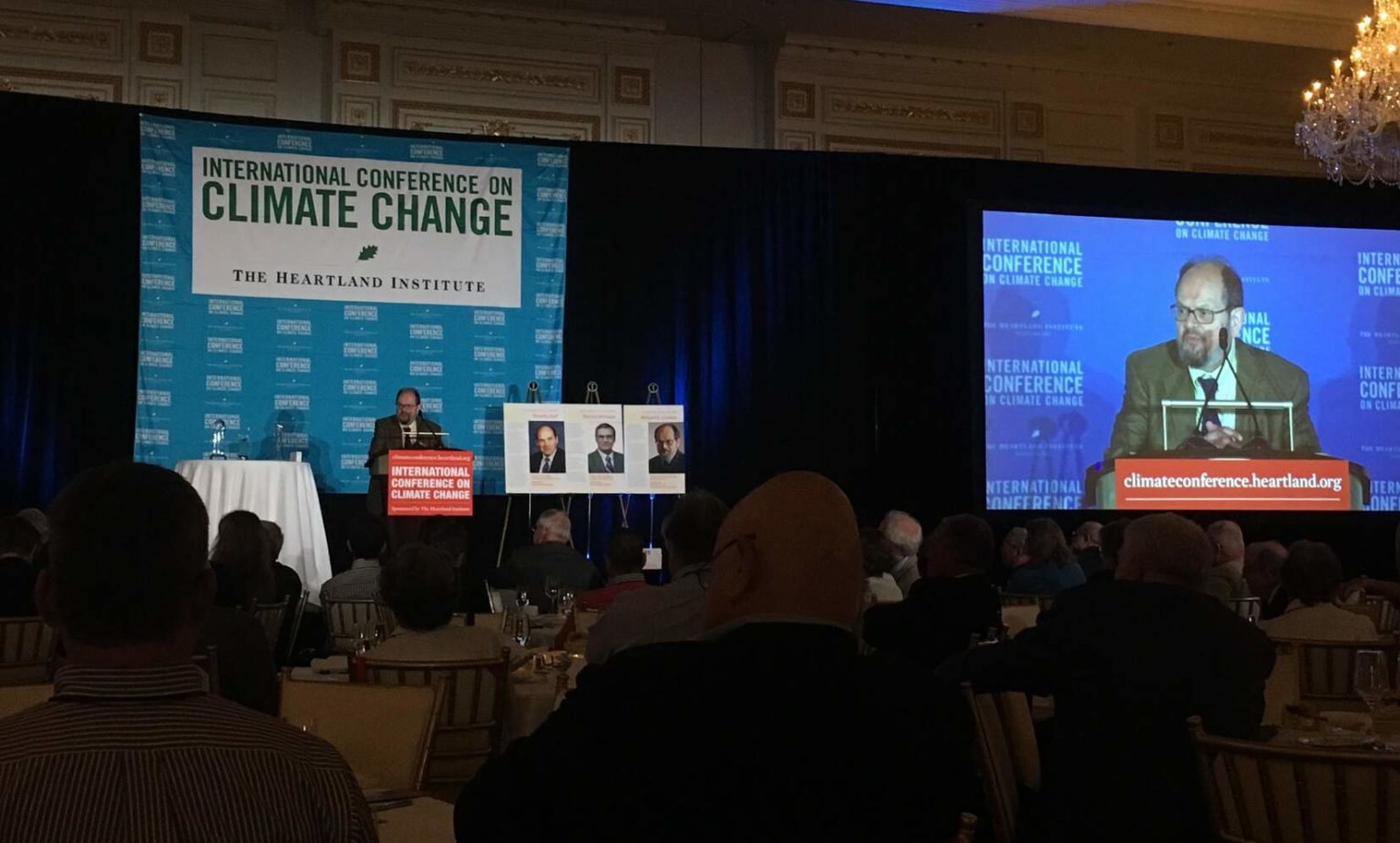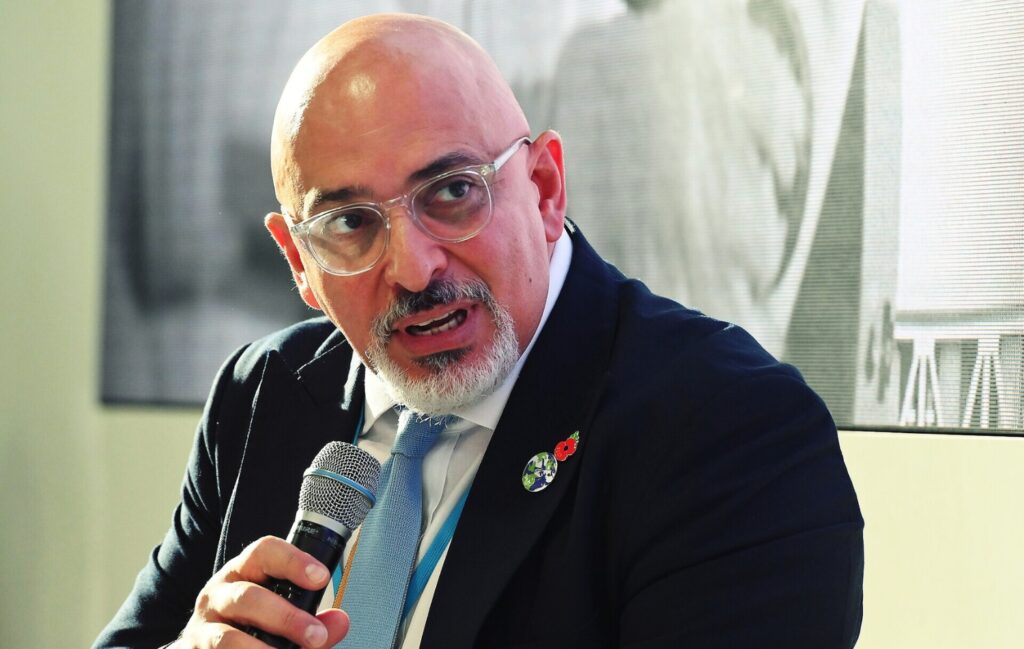Last week, the Heartland Institute was again trumpeting climate science denial at its 13th “International Conference on Climate Change” at the Trump Hotel in Washington, D.C. But by a number of measures, the Chicago-based free market think tank’s science denial doesn’t exactly seem to be a growing — or cohesive — movement at this point.
That’s even with more media coverage than five years ago, and with friends in high places. In early 2017, following the election of President Trump, attendees of the Heartland Institute conference were clearly excited to have a climate denier in the White House. Frontline reported that the mood at the conference was “jubilant.”
Even last year, the organization was projecting an air of optimism. Former Congressman Tim Huelskamp was still Heartland president and confidently declaring victory for the climate denial movement.
“It took a while, but we think we’ve won the battle — Al Gore was wrong,” Huelskamp said.
So, how are things going for Heartland these days?
The first big news out of the 2019 conference was the announcement that Heartland’s board had elected a new president after the sudden and unexplained resignation of Huelskamp from that position in June.
The new president is Frank Lasee, a former Wisconsin state legislator and member of Governor Scott Walker’s administration. Noticeably absent from the press release announcing his new position — at Heartland’s climate science denial conference — was any mention of climate denialism.
Not exactly what you would expect from the group who not long ago claimed it had “won the battle” about the purported reality of climate change.
Shorter Conference, Fake Sponsor, Low Attendance, and a Lot of Gray Haired Men
In 2008, Heartland’s climate conference was a three day affair. Over a decade later, it is down to a single day. In 2008, the event drew over 50 co-sponsors. This year’s conference pamphlet listed only 16. And as it turns out, one of those was fake.
Heartland’s conference pamphlet lists Fidelity Charitable as a co-sponsor for the 2019 event, but there was a slight problem with that. It wasn’t true.
The Heartland Institute’s climate denial conference literature listing co-sponsors, including the incorrect listing of Fidelity Charitable.
Heartland had to pull the Fidelity Charitable logo from its conference sponsors webpage after the investigative organization Documented revealed that Fidelity was not an actual sponsor. However, the name and logo remained on the printed materials at the conference.
Since President Trump’s election, Heartland has started a new series of events to promote fossil fuel use called the “America First Energy Conference.” This theme fits with its past, though apparently waning, financial support from oil, gas, and coal companies. According to Frontline, the most recent of these conferences held in 2018 wasn’t very well attended, reporting that “most of the day it had an audience of 100 or fewer.”
A firsthand account from a conference attendee noted similar activity at the conference last week, with the hotel hallways often hosting more people than the presentation room.
However, while Heartland climate denial conferences may have dwindling sponsors, activities, and attendees, they can still claim to be very popular among old, white men. There is never a shortage of gray hair in the audience at a climate denial conference.
Presentation at the Heartland Institute’s 13th International Conference on Climate Change.
In addition, the speakers for a conference with an audience of mostly old, white men consisted of mostly men. Out of 27 listed speakers, only two were women. The speaker line-up drew from the usual suspects in climate denial circles, such as Tim Ball, Myron Ebell, and Christopher Monckton.
Climate science denial doesn’t seem to be a welcoming place for women. Organizations promoting climate science denial in the UK employ few women, and female climate scientists report frequent gender-based attacks and harrassment, mostly from men.
Heartland’s core demographic doesn’t bode well for its future.
Banning ‘Garbage’ Journalism
In addition to dwindling attendees and sponsors, Heartland’s media policy is to refuse credentials to anyone who offends them by reporting on their climate science denial. Mother Jones climate reporter Rebecca Leber has covered past Heartland conferences, but apparently she has worn out her welcome. Leber posted her rejection letter from Heartland communications director and interim president Jim Lakely on Twitter.
I regret to inform you my garbage journalism got me barred from covering Heartland Institute’s climate conference happening at Trump’s DC hotel tomorrow pic.twitter.com/ehhzAVV132
— Rebecca Leber (@rebleber) July 25, 2019
It is a similar response that DeSmog reporter Ben Jervey received in 2017, in which Lakely said DeSmog was “not a legitimate news outlet” and thus would not get press credentials, despite having invited DeSmog’s Graham Readfearn, who is based in Australia and has written for the Guardian, to attend.
This year, Lakely apparently ejected George Mason University researcher John Cook, who studies how to combat misinformation about climate science, from Heartland’s conference after Cook had been attending for at least two hours and had interviewed several of the speakers for the Weather Channel.
Update: @johnfocook has been kicked out of the Heartland Conference pic.twitter.com/22SlKuSuvU
— Joe McCarthy (@notjoemccarthy) July 25, 2019
Heartland’s Red Team vs. Blue Team Efforts Failed
At 2017’s “jubilant” conference, Heartland speakers promoted the idea of a Red Team vs. Blue Team “debate” on climate science. This concept involves pitting noted climate science deniers against mainstream climate scientists to allegedly debate the validity of climate change science, something then-Environmental Protection Agency (EPA) head Scott Pruitt seemed open to conducting. But in Heartland’s eyes, Pruitt wasn’t committed enough to the idea.
In October 2017, leaked internal Heartland emails detailed the organization’s concerns: “EPA Administrator Scott Pruitt’s proposal for a Red Team-Blue Team exercise is vague, probably would not be effective, and is unlikely to come about.”
However, Pruitt’s scandal-plagued time in D.C. has since come to a close, and these days he has reportedly been working as a lobbyist for the coal industry.
The New York Times reported in March 2018 that Trump’s Chief of Staff John F. Kelley had killed the idea of the Red vs. Blue Teams debate as members of the White House staff thought it was “ill-conceived and politically risky.”
In the end there was no Red Team vs. Blue Team project by the Trump administration despite this being a top priority of Heartland, a concept which the group has been espousing since at least 2009.
A Failing Business Model?
The oil industry is still spending heavily against policies to address climate change and in support of efforts to promote fossil fuel consumption. These days, however, the messaging and efforts seem to be moving away from Heartland-style denial attacks on climate science and tuned more toward PR campaigns promoting the idea that oil and gas companies accept climate change is happening and are doing their part to address it.
That’s likely driven in part by the fact that public awareness of and concern about climate change has significantly increased since 2008.
The list of talking points at https://t.co/xb4sVkeq7K reads like the list of climate myths at https://t.co/HYOLcOjBof
— John Cook (@johnfocook) July 25, 2019
The industry’s new approach appears focused on selling the idea that natural gas is “clean” and that fossil fuels are the future — even a “solution” to climate change. Meanwhile, across the U.S., coal plants are closing, the gas industry is a financial disaster, and renewables are growing rapidly and in many cases can provide electricity more cheaply than gas power plants.
The Cato Institute, another free market think tank that for years pushed climate science denial and received funding from the fossil fuel industry, dropped its climate denial program earlier this year. Cato was founded by the petrochemical billionaire Charles Koch.
Will Heartland follow a similar path to attract broader appeal and fossil fuel industry funding?
Slide from presentation at the Heartland Institute’s 13th International Conference on Climate Change.
Main image: Presentation at the Heartland Institute’s 13th International Conference On Climate Change.
Subscribe to our newsletter
Stay up to date with DeSmog news and alerts







